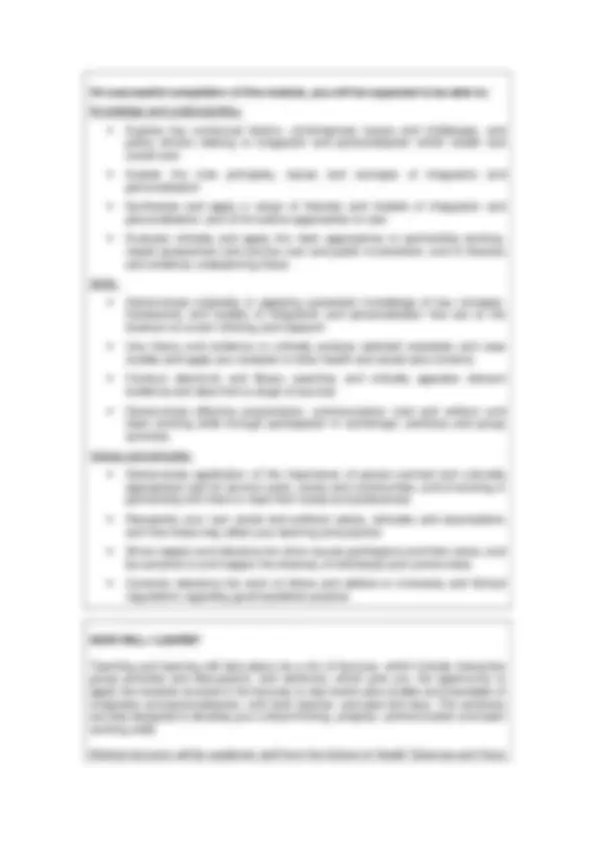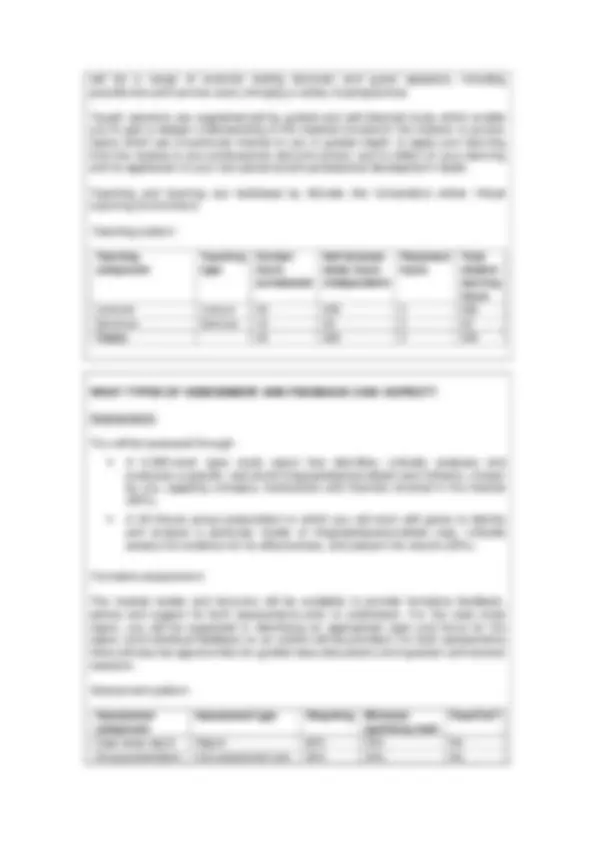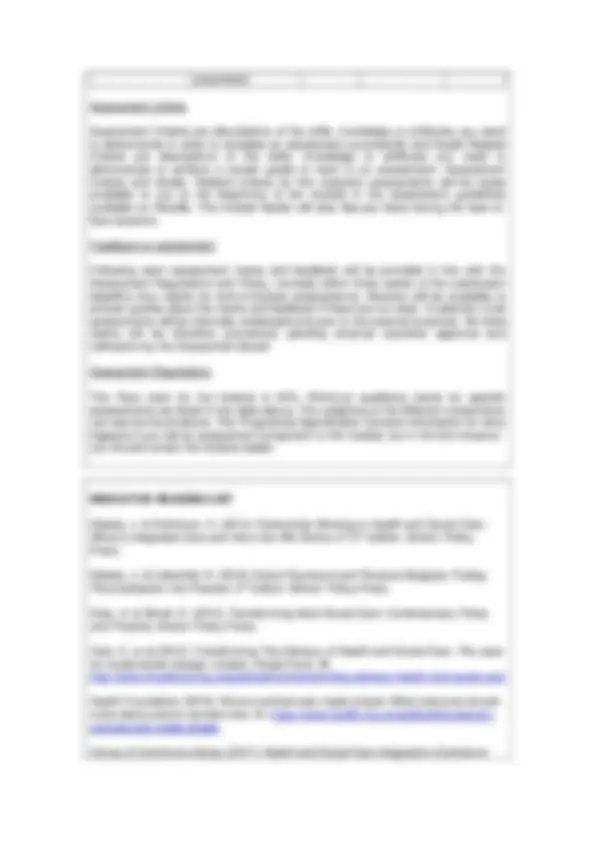





Study with the several resources on Docsity

Earn points by helping other students or get them with a premium plan


Prepare for your exams
Study with the several resources on Docsity

Earn points to download
Earn points by helping other students or get them with a premium plan
Community
Ask the community for help and clear up your study doubts
Discover the best universities in your country according to Docsity users
Free resources
Download our free guides on studying techniques, anxiety management strategies, and thesis advice from Docsity tutors
Information about a university module titled 'Integrated and Person-Centred Health and Social Care'. The module aims to help students understand the challenges facing health and social care services, the need for more integrated and personalised approaches to care delivery, and recent policy responses and new models of care. Topics covered include challenges and policy drivers, key concepts and theories, partnership working, needs assessment, and user engagement. Assessments include a group presentation and critical analysis of a model of integrated/personalised care.
What you will learn
Typology: Study notes
1 / 6

This page cannot be seen from the preview
Don't miss anything!




Module name Integrated and Person-Centred Health and Social Care Module code HRM School Health Sciences Department or equivalent Division of Health Services Research and Management UK credits 30 ECTS 15 Level 7 MODULE SUMMARY Module outline and aims The health and social care landscape is undergoing significant and rapid change. Advances in health technologies, rising costs of care, increasing consumer demand, ageing populations, the increasing prevalence of long-term conditions and other pressures present significant and growing challenges. As a result, health and social care services are often fragmented and hard to access, and are failing to keep pace with people’s changing health and social care needs (Ham, 2012). It is increasingly clear that minor or incremental changes to existing models of care are not sufficient to address these challenges, and that much bolder approaches are needed. Integrated care aims to improve quality and efficiency by providing more joined-up, coordinated health and social care services. It also involves working in partnership with other sectors, such as housing, education and the criminal justice system. At the heart of integrated care is person-centred (or personalised) care, the principle that care should be planned and organised around the needs and preferences of individuals, carers and communities, so that people have choice and control over the way their care is planned and delivered. It should engage service users and carers as equal partners, and put into practice the principle of ‘no decision about me without me’. Integrated and person-centred care have been shown to improve health and other outcomes for service users, and to reduce fragmentation and inefficiencies in service delivery. It is also seen as a key mechanism for addressing staff shortages, financial pressures and the growing demand for services. As a result, it is now a top priority among policymakers in many countries, including England (NHS Long Term Plan, 2019). Key themes include shared decision making and giving people more control over their own health and care; more effective collaboration between primary care, community services, local councils and other partners; and ensuring people can access services such as transport, leisure, education and housing. Such an ambitious policy agenda clearly has significant implications for health and social care organisations, and for those professionals directly involved in delivering care. There are many excellent examples of integrated services delivering significant
improvements in care. However, progress has been slow and uneven, and much work is still needed to embed the culture and practice of integrated care across the health and social care system. Creating and sustaining genuine change requires organisations and professionals to work differently, however they vary widely in their preparedness for change, and in the skills, resources and leadership capacity available to them. This module aims to:
will be a range of external visiting lecturers and guest speakers, including practitioners and service users, bringing a variety of perspectives. Taught sessions are supplemented by guided and self-directed study which enable you to gain a deeper understanding of the material covered in the module, to pursue topics which are of particular interest to you in greater depth, to apply your learning from the module to your professional role and context, and to reflect on your learning and its application to your own personal and professional development needs. Teaching and learning are facilitated by Moodle , the University’s online Virtual Learning Environment. Teaching pattern: Teaching component Teaching type Contact hours (scheduled) Self-directed study hours (independent) Placement hours Total student learning hours Lectures Lecture 30 230 0 260 Seminars Seminar 10 30 0 40 Totals: 40 260 0 300 WHAT TYPES OF ASSESSMENT AND FEEDBACK CAN I EXPECT? Assessments You will be assessed through:
presentation Assessment criteria Assessment Criteria are descriptions of the skills, knowledge or attributes you need to demonstrate in order to complete an assessment successfully and Grade-Related Criteria are descriptions of the skills, knowledge or attributes you need to demonstrate to achieve a certain grade or mark in an assessment. Assessment Criteria and Grade- Related Criteria for this module's assessments will be made available to you at the beginning of the module in the assessment guidelines available on Moodle. The module leader will also discuss these during the face-to- face sessions. Feedback on assessment Following each assessment marks and feedback will be provided in line with the Assessment Regulations and Policy, normally within three weeks of the submission deadline (four weeks for end-of-module assessments). Markers will be available to answer queries about the marks and feedback if these are not clear. A selection of all assessments will be internally moderated and sent to the external examiner. All initial marks will be therefore provisional, pending external examiner approval and ratification by the Assessment Board. Assessment Regulations The Pass mark for the module is 50%. Minimum qualifying marks for specific assessments are listed in the table above. The weighting of the different components can also be found above. The Programme Specification contains information on what happens if you fail an assessment component or the module, but in the first instance you should contact the module leader. INDICATIVE READING LIST Glasby, J. & Dickinson, H. (2014) Partnership Working in Health and Social Care: What is Integrated Care and How Can We Deliver it? 2 nd^ Edition. Bristol: Policy Press. Glasby, J. & Littlechild, R. (2016) Direct Payments and Personal Budgets: Putting Personalisation into Practice. 3 rd^ Edition. Bristol: Policy Press. Gray, A. & Birrell, D. (2013) Transforming Adult Social Care: Contemporary Policy and Practice. Bristol: Policy Press. Ham, C. et al (2012) Transforming The Delivery of Health and Social Care: The case for fundamental change. London: King’s Fund. At: http://www.kingsfund.org.uk/publications/transforming-delivery-health-and-social-care Health Foundation (2016) Person-centred care made simple: What everyone should know about person-centred care. At: https://www.health.org.uk/publications/person- centred-care-made-simple. House of Commons Library (2017) Health and Social Care Integration (Commons